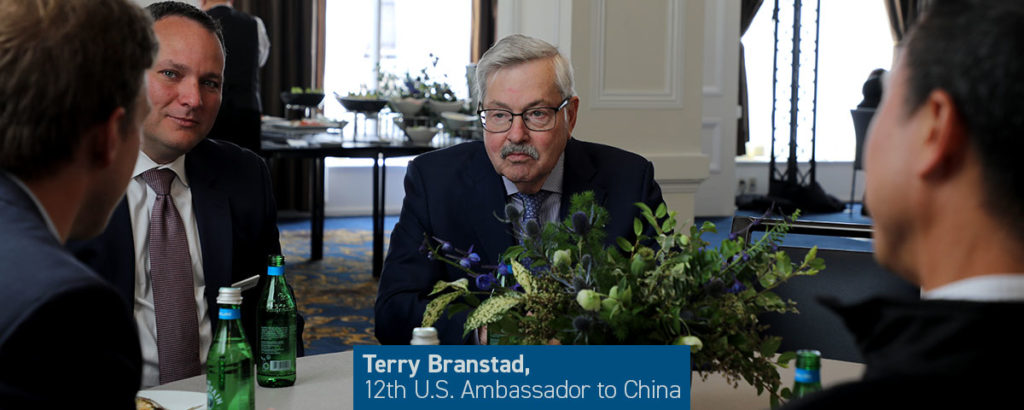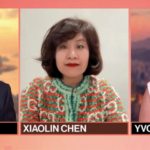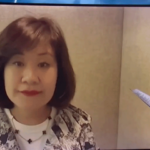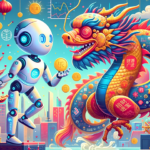Terry Branstad, 12th U.S. Ambassador to China, On President Xi, COVID Zero, and US-China Relations

U.S. Ambassador (Ret.) Terry Branstad represented the United States during a particularly challenging time in US-China relations. He served as the 12th U.S. Ambassador to China during the administration of President Donald Trump. His tenure included implementation of new tariffs on Chinese exports to the U.S, which ultimately led to high level negotiation and agreement on some issues between the two countries.
Branstad was tapped by Trump in part because of his long-standing relationship with Chinese President Xi Jinping dating to 1985. The two first met while Xi Jinping was visiting Iowa as part of a sister state partnership that Branstad helped establish during his first of six terms as the Governor of Iowa.
KraneShares regularly engages with policy makers to give investors special insight into US-China relations. Recent programs have included discussions with former U.S. Secretary of State Henry Kissinger, U.S. Ambassador to China during the Obama Administration Max Baucus, and former U.S. Secretary of the Navy Ray Mabus. Branstad recently joined a discussion with KraneShares General Counsel and former U.S. Ambassador to Singapore, David Adelman, at the KraneShares Bay Area Innovation Forum in San Francisco.
The main takeaways from Ambassador Branstad were as follows:
- China's plan to become the premier world power is dependent on President Xi's ability to address political, economic, and military concerns on a local and global basis.
- One of the biggest hurdles that China currently faces is the impact of the Covid-19 pandemic and lockdowns under China's zero-tolerance policy.
- China must find solutions to mend its relationships with the United States and other countries in trade and public equity markets.
We have summarized the key highlights of the discussion and provided the video of the discussion below.
China's Five-Year Plan
Adelman began the discussion by asking Branstad his opinion of domestic Chinese politics and President Xi’s vision for China’s future. Ambassador Branstad stated, “A lot of people think that he (President Xi) will not only serve another five years, but it may be beyond that, and certainly I think he is in a position to do that.” Branstad noted that President Xi currently has three titles within the Chinese government, which besides the President of China, include General Secretary to the Communist Party and Commander-in-Chief of the People’s Liberation Army.
Over the next five years, President Xi has formulated several ambitious goals for China. He strongly desires China to be considered the world’s leader politically, economically, and militarily. He plans on accomplishing these objectives through various forms of government policy.
Branstad said that President Xi plans to provide significant investments and subsidies for emerging technology-focused companies to help propel China’s position as a world-leading technological powerhouse. In the coming years, infrastructure projects will be a priority to strengthen the economy and overcome the negative economic impact of Covid-19. President Xi also desires to address the growing financial gap between social classes within China and create a more level playing field for all those living in the country. Branstad commented that if President Xi accomplishes these goals, China will become more prosperous than ever.
Covid-19 in China
Adelman asked Branstad to comment on the latest wave of Covid-19 infections in China and steps the government is taking to control the virus.
In recent weeks, China has re-implemented its zero-tolerance policy to contain and eliminate the threat of the virus. Many hope that China can effectively manage this policy, with a population of close to 1.4 billion people.
Fears of further shutdowns in major cities within China have dominated headlines worldwide. Concerns around the efficacy of Chinese vaccines have risen due to their seemingly lower success rate than the western world’s equivalents. China’s population also faces a low vaccination rate among citizens compared to other comparable countries, delaying progress in battling the virus.
However, Branstad said he is confident China will bring the pandemic under control within its borders before this year’s election because controlling the virus is critical for President Xi’s reelection campaign.
Russia-Ukraine Conflict
Anticipation is growing worldwide as people wait to see how China will react to the Russia-Ukraine conflict. Ambassador Branstad believes China could act in two ways. The first, which he considers to be the better choice, is to take a neutral stance and either stay out of the conflict or assist both sides rather than solely Russia. The other option is to join Russia’s side in the conflict and aid them financially, including military supplies and personnel.
On the other side, Branstad pointed out that while the North Atlantic Treaty Organization (NATO) was slow to respond to the conflict, several new countries have shown interest in gaining membership to assist Ukraine and take advantage of the alliance’s various benefits.
Adelman asked Branstad for his view on whether China would involve itself or remain neutral in the Ukraine conflict. Ambassador Branstad emphasized multiple arguments detailing why China joining Russia’s cause would be problematic. He stated that “significant sanctions have been placed on Russia by NATO members to cause substantial negative impacts on their economy and persuade them to end their invasion of Ukraine.” He pointed out that if China were to join Russia, similar sanctions could be imposed on China. If this were to happen, it could potentially be highly harmful not only to China but to the global economy.
Branstad further stated that “China is acknowledging the sanctions against Russia, which is a hopeful sign they will not be joining Russia in their invasion of Ukraine.” Branstad said China receives oil and natural gas from Russia but sacrificing that small portion of their imports is much less harmful than the impact of secondary sanctions. Adelman added that incurring sanctions would run counter to President Xi’s clear economic goals.
Trade Relationship Between China & The U.S.
During the Trump Administration and Branstad’s tenure in the U.S. Embassy in Beijing, tariffs were imposed on China with the stated goal to achieve a fairer trade agreement for the United States. According to Branstad, these tariffs were essential for making strides toward a new trade deal between the two countries.
Initially, China retaliated against the U.S. by decreasing imports of U.S. food, which negated a large portion of agricultural purchases in the United States. To counter this, President Trump’s administration increased subsidies to U.S. farmers to allow them to continue operations as usual. Branstad emphasized that China relies on American agriculture to assist in feeding its large population.
Ambassador Branstad said, “The United States and China have an interdependent relationship concerning trade, both needing each other as much as the other.” The “trade war” made this fact abundantly clear as both economies suffered negative impacts.
After two years of meetings between officials from both countries, the initial round of tariffs placed on China by the U.S. led to a Phase 1 trade deal. Branstad said this deal led to “record agriculture purchases” in the United States by China.
Public Equity Markets & The Fear of Delisting
In recent months, Chinese companies have encountered the possibility of being delisted from U.S. exchanges. Branstad noted that until now, Chinese companies listed on U.S. exchanges could avoid in-person audits that presumably promote transparency for investors.
The U.S. Public Company Accounting Oversight Board (PCAOB) is preparing to enforce the rules by actively creating a list of Chinese companies, which have yet to comply with U.S. accounting laws. The PCAOB has set a deadline in 2024 for these companies to comply. If they fail to do so, they could be delisted.
When asked about this issue, Ambassador Branstad remarked that “China has acknowledged this move towards transparency, with some officials worried about national security issues. Branstad did not think China would ultimately defy the accounting requirements. He pointed to recent comments by China’s top economic official Liu He that China intends to “work this problem out” with U.S. officials. Branstad also stated that he is “confident China will be able to comply with the PCAOB’s requests for greater accounting transparency and expects only a handful of companies to be delisted.”
Common Prosperity - China's Growing Middle Class
Over the past year, President Xi has made it clear that China faces problems related to its growing middle-class and disparity between economic classes. China's middle class now contains more people than the entire United States population. President Xi has emphasized the idea of common prosperity, which he plans to implement to decrease the inequality between wealth in China’s urban centers and China’s rural regions.
President Xi’s goal is to increase income for the rural population, which he admits can only be solved over a long time period, hoping to transition all of China into a consumer-based economy. To successfully make this transition towards consumerism, President Xi must devise a plan to increase purchasing power among all Chinese citizens.
Ambassador Branstad attested to the disparity between classes as he spoke about his many visits to China. He noted how “China’s cities have a large number of luxury stores that even surpass what you may see in most U.S. cities.” However, he also explained that when he visited villages in the rural areas of China, he discovered “much of this population had trouble affording necessities such as proper healthcare.” Ambassador Branstad noted that common prosperity has worked in the past, and he believes that if it is implemented again effectively, China’s middle class could truly thrive.
Technology in China
President Xi’s ambitions, as described in the “China 2025” plan, are central to China’s economic development, said Branstad. In short, China has allocated substantial resources to propel China as the world leader in the emerging technologies sector. Branstad agreed with most commentators that President Xi is committed to China’s will increased technological independence by 2025 by reducing its reliance on foreign countries.
Ambassador Branstad declared this goal has caught the attention of the United States and has led to the realization that “they (The U.S) have been too naïve for far too long concerning stolen technology.” The idea that China has steadily been taking technological advancements from the United States is a phenomenon Branstad referred to as the Huawei Experience.
Ambassador Branstad believes that the hundreds of thousands of people who came to the U.S. from China for a college education were able to bring technological innovations back to China. He imagines that intellectual property protection concerning technology is in both countries’ best interests.
Cross-Strait Relations
Branstad briefly discussed cross-strait relations between China and Taiwan. According to Branstad, President Xi and most other Chinese officials are adamant about having Taiwan under Chinese control. Taiwan is currently the world’s leading producer of semiconductors, which Branstad pointed out is a key driver of China’s interest.
Ambassador Branstad noted, “Taiwan is fearful of China acting after witnessing the loss of rights Hong Kong experienced when taken over by China.” He believes China will not push for a forced Taiwan takeover until they achieve “complete military superiority.”
The Ambassador also noted that it might not be in the best interest of China to occupy Taiwan after witnessing the cost of occupation Russia is currently experiencing in Ukraine.
President Xi's Legacy
Ambassador Branstad believes President Xi wants to leave a legacy of setting the path for China to become the leading world power. President Xi has made several promises and goals to achieve this.
President Xi aspires for China to be well respected by the rest of the world. He believes he can accomplish this through the Belt and Road Initiative, a global infrastructure development strategy set to expand China’s influence worldwide. By ensuring the loyalty of Chinese companies to the communist party, President Xi can continue to influence operations on a global scale.
Global competition has been a product of this ambition, rather than cooperation, which Ambassador Branstad believes to be the better option. New technological and defense innovations are the primary sources of competition between China and other leading countries.
While competition is apparent and encouraged, the Ambassador stated that “we have now transitioned into a world economy where all countries are interdependent and intertwined.”
Question from the Audience
An audience member asked Ambassador Branstad, “How far do you think the United States wants to escalate a Cold War with China, and how much do you think the United States wants to do business in the Chinese markets?”
Ambassador Branstad responded, “We don’t really want a Cold War with China. Rather, we want fair competition and to make sure that our companies and Americans are treated fairly in China. We want them to compete here (in the U.S.) as long as they comply with our rules.”
He explained that it is key for President Xi to agree to a fair, competitive relationship between both countries and for China to follow the same set of rules the rest of the world follows. The Ambassador believes this is the best way for President Xi to accomplish his goal of being respected on a global scale.
Conclusion
From his unique perspective and depth, Ambassador Branstad provided great insights at the KraneShares Bay Area Innovation Forum in San Francisco. He believes that President Xi is focused on making China a world-class technological powerhouse, lowering income inequality, and increasing domestic consumption. Branstad’s views highlight the interdependent nature of the current world economy and the importance of the US-China relationship in politics and investment portfolios.
This is a marketing communication. Please refer to the prospectus of the UCITS and to the KIID before making any final investment decisions.


















